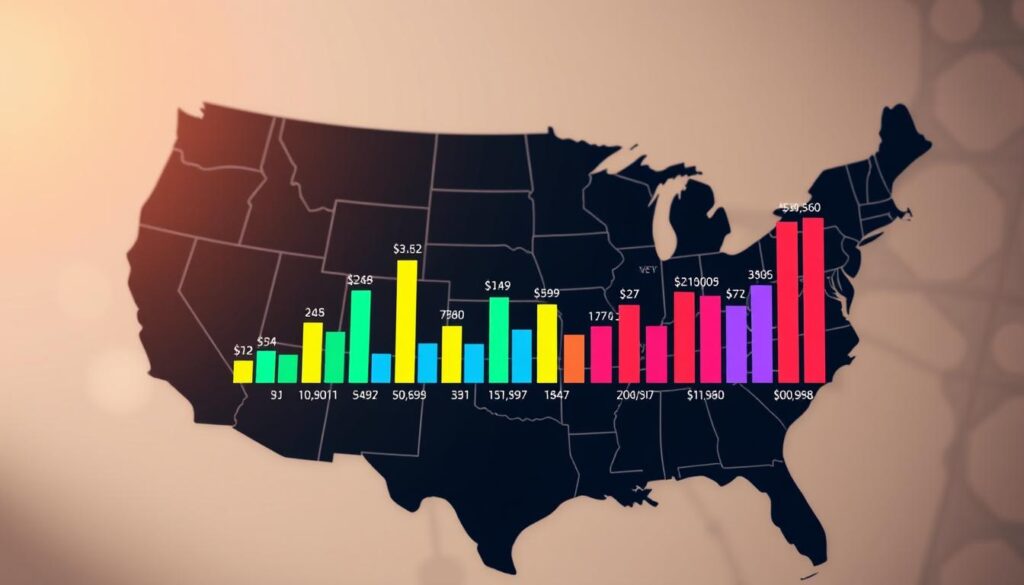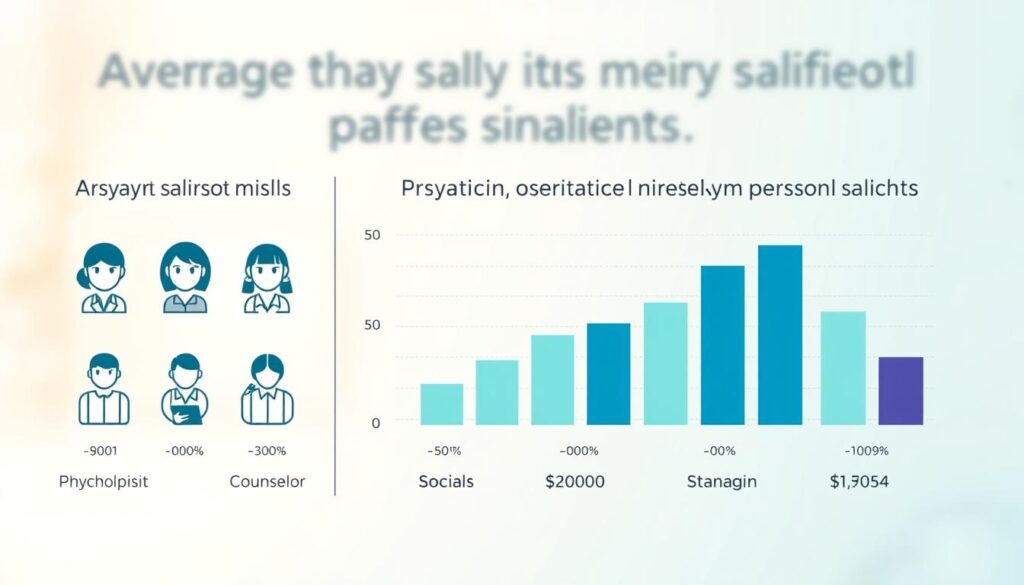Pursuing a career as a mental health therapist can be a rewarding and challenging profession. As the demand for mental health services continues to grow, understanding the financial aspects of this career path becomes increasingly important.
The salary for mental health therapists in the United States varies based on factors such as experience, location, and workplace setting. On average, these professionals can expect to earn around $78,534 annually.
Starting salaries typically begin around $44,914, while experienced professionals with 20+ years in the field can earn upwards of $90,000 annually. This comprehensive guide will explore the national averages, salary ranges, and factors that influence compensation in this growing field.
Key Takeaways
- National average salary for mental health therapists is approximately $78,534 annually.
- Starting salaries begin around $44,914.
- Experienced professionals can earn upwards of $90,000 annually.
- Salary ranges vary based on experience, location, and workplace setting.
- Understanding salary ranges helps in career planning and setting realistic expectations.
Understanding the Mental Health Therapist Profession
Mental health therapists play a crucial role in helping clients overcome psychological challenges and improve their overall well-being. They work directly with individuals facing various mental health issues, providing therapeutic interventions tailored to their needs.
Role and Responsibilities
The core responsibilities of a mental health therapist include conducting assessment interviews, developing treatment plans, and facilitating individual and group therapy sessions. They must maintain detailed client records and coordinate with other healthcare professionals to ensure comprehensive care. Mental health therapists work with clients experiencing depression, anxiety, PTSD, OCD, and bipolar disorder, among other conditions.
The profession demands strong interpersonal skills, emotional resilience, and ethical judgment. Therapists must maintain professional boundaries while working with vulnerable populations, making it a challenging yet rewarding career.
Required Education and Licensing
To practice as a mental health therapist, one typically needs at least a master’s degree in counseling, psychology, social work, or a related field. Licensing requirements vary by state but generally include completing 2,000-4,000 supervised clinical hours and passing a national examination. Continuing education is also necessary to maintain licensure.
Here’s an overview of the typical educational pathway and licensing requirements for mental health therapists:
| Education Level | Typical Degree | Licensing Requirements |
|---|---|---|
| Master’s | Counseling, Psychology, Social Work | Supervised Clinical Hours, National Exam |
| Doctoral (Optional) | Ph.D. or Psy.D. in Psychology | Additional Specializations or Certifications |
Mental health therapists can work in various settings, including hospitals, community mental health centers, private practices, schools, and corporate employee assistance programs. This diversity in work environments allows therapists to choose settings that align with their interests and skills.
Average Mental Health Therapist Salary in the US
Understanding the average salary for mental health therapists is essential for both aspiring and current professionals in this field. The average salary provides a baseline understanding of the financial aspects of this profession.
National Salary Overview
The national average salary for mental health therapists in the United States is $78,534 annually. This figure varies significantly based on multiple factors, including location, experience, and specialization.
- The average annual salary is $78,534.
- Salary data indicates variations based on factors like location and experience.
Starting vs. Experienced Therapist Compensation
There’s a significant difference between the salary of starting and experienced mental health therapists. Entry-level professionals start with a base salary around $44,914, while experienced therapists can earn up to $148,500 annually.
- Starting salary is around $44,914.
- Experienced therapists can earn up to $148,500.
Salary Progression by Experience Level
Mental health therapist salaries follow a clear progression pattern based on years of experience, with significant jumps at key career milestones.
Entry-Level Earnings (0-4 Years)
Entry-level mental health therapists can expect to earn around $44,914 in their first year. As they gain experience, their salaries increase modestly. By 1-4 years of experience, their average salary rises to approximately $49,000.
Mid-Career Earnings (5-9 Years)
By the time mental health therapists reach 5-9 years of experience, their average salary is around $53,000. At this stage, many have established a strong client base and clinical expertise.
Experienced Therapist Earnings (10+ Years)
Therapists with 10-19 years of experience see a substantial increase, earning an average of $78,534. Those with 20+ years of experience can earn around $90,000, with some exceeding this figure, especially in private practice or specialized fields.
| Experience Level | Average Salary |
|---|---|
| 0-1 year | $44,914 |
| 1-4 years | $49,000 |
| 5-9 years | $53,000 |
| 10-19 years | $78,534 |
| 20+ years | $90,000 |
Geographic Variations in Mental Health Therapist Salaries

The salary for mental health therapists is not uniform across the US, with different regions offering different compensation levels. This variation is significant, with some states and cities providing substantially higher salaries than others.
Highest-Paying States
Some states stand out for offering higher salaries to mental health therapists. Alaska leads with an average annual salary of $63,900, followed by Wyoming ($55,900), Utah ($55,150), and North Dakota ($52,790). Other high-paying states include Maine, Oregon, and New Jersey, with average salaries ranging from $50,720 to $50,210.
Top-Paying Cities and Metropolitan Areas
At the city level, Napa, California offers the highest average annual salary at $78,660. Other top-paying cities and metropolitan areas include Southeast Alaska nonmetropolitan area ($73,510), Bend, Oregon ($68,490), and Anchorage, Alaska ($66,940). Notably, Poughkeepsie-Newburgh-Middletown, New York is among the top-paying urban areas, with an average annual salary of $64,030.
Factors Affecting Mental Health Therapist Salary
The salary of a mental health therapist is influenced by multiple factors that can significantly impact their earning potential. These factors can be broadly categorized into workplace settings and professional specializations or certifications.
Workplace Settings and Their Impact on Earnings
The workplace setting plays a crucial role in determining a mental health therapist’s salary. Therapists in private practice often have higher earning potential, although it may take time to establish a client base. In contrast, those employed in hospital settings or specialized treatment facilities typically receive more stable salaries and comprehensive benefits.
Here’s a breakdown of average salaries by workplace setting:
| Workplace Setting | Average Salary Range |
|---|---|
| Private Practice | $60,000 – $100,000+ |
| Hospital Settings | $50,000 – $80,000 |
| Specialized Treatment Facilities | $45,000 – $75,000 |
Specialization and Additional Certifications
Specializing in high-demand therapeutic approaches or obtaining additional certifications can substantially increase a therapist’s market value and salary potential. Certifications in areas like addiction counseling or trauma therapy can command salary premiums of 10-15% above the standard rate.
Some of the in-demand specializations include:
- Cognitive-behavioral therapy
- Dialectical behavior therapy
- EMDR therapy
- Child and adolescent mental health
Salary Comparison with Related Mental Health Professions

Comparing salaries across related mental health professions reveals interesting insights into how education, specialization, and work setting impact earnings. Mental health therapists earn competitive salaries within the broader mental health field, though certain specialized roles command higher compensation.
Counseling Psychologists
Counseling psychologists, who typically hold doctoral degrees, focus on patients without diagnosed mental illnesses and earn an average of $80,000 annually.
Neuropsychologists
Neuropsychologists, with their extensive education and specialized training in brain-behavior relationships, represent one of the highest-paid specialties, earning an average of $92,640 annually.
School Psychologists
School psychologists, working within educational settings, earn between $63,000-$100,000 annually, with variations based on factors like school district funding and years of experience.
| Profession | Average Salary | Education Level |
|---|---|---|
| Counseling Psychologists | $80,000 | Doctoral Degree |
| Neuropsychologists | $92,640 | Doctoral Degree |
| School Psychologists | $63,000 – $100,000 | Master’s/Doctoral Degree |
Career Growth and Earning Potential
The mental health therapist profession is experiencing significant growth, driven by increasing awareness and acceptance of mental health services. This growth is reflected in the promising career prospects and rising earning potential for professionals in this field.
Job Outlook Through 2033
According to the U.S. Bureau of Labor Statistics, employment for mental health counselors is expected to grow 18.8% through 2033, much faster than the average for all occupations. This robust growth is driven by factors such as increasing awareness of mental health issues and expanded insurance coverage for mental health services.
Strategies to Increase Your Earning Potential
Mental health therapists can boost their earning potential by establishing a private practice, which allows for direct control over client volume and fee setting. Specializing in high-demand therapy niches can also command premium rates.
Private Practice Opportunities
Opening a private practice can significantly increase a therapist’s earning potential. By working for themselves, therapists can retain all earnings and potentially achieve higher salaries than working for others. For more information on mental health therapist salaries, visit https://psychologyjobs.com/mental-health-therapist-salary/.
To maximize earning potential, therapists can also focus on building multiple revenue streams through clinical work, consulting, teaching, and creating digital products. Effective time management is crucial to balance client hours with administrative tasks and avoid burnout.
Conclusion: Is a Mental Health Therapist Career Worth It Financially?
A career in mental health therapy presents both financial and personal rewards. With a national average salary of $78,534 annually, mental health therapists can expect a solid middle-class income. Location significantly impacts earning potential, with states like Alaska and Utah offering high base compensation. The profession is also projected to grow by 18.8% through 2033, indicating strong job security. Beyond financial considerations, therapists often report high job satisfaction and a good work-life balance. When evaluating this career path, consider the total compensation package, including benefits and opportunities for professional growth.
FAQ
What is the average yearly compensation for a therapist in New York?
The average yearly compensation for a therapist in New York can vary based on factors like experience, workplace setting, and specialization. According to recent data, therapists in New York tend to earn higher than the national average.
How does experience impact a therapist’s earnings?
Experience significantly impacts a therapist’s earnings. Those with more years of experience, particularly in private practice, tend to earn higher salaries compared to entry-level professionals.
What are the highest-paying workplace settings for therapists?
Therapists working in private practice or in certain community settings tend to have higher earning potential compared to those in traditional counseling roles.
Can additional certifications increase a therapist’s earning potential?
Yes, obtaining additional certifications or specializing in a particular area of therapy can increase a therapist’s earning potential by making them more competitive in the job market.
How do salaries for therapists compare to other related professions?
Salaries for therapists can vary compared to other related professions like counseling psychologists or school psychologists. Factors such as education level, licensing, and work experience play a significant role in determining these differences.
What is the job outlook for therapists through 2033?
The job outlook for therapists is positive, with a growing demand for therapy services expected through 2033, driven by an increased focus on treatment and community care.

